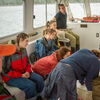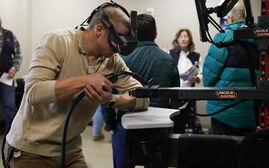On the Record: Maine Business School chief bullish on climate for startups
 Photo / Jim Neuger
Jason Harkins, executive dean of the Maine Business School and dean of the Graduate School of Business at the University of Maine, says this year’s class of 314 first-year students is the biggest ever.
Photo / Jim Neuger
Jason Harkins, executive dean of the Maine Business School and dean of the Graduate School of Business at the University of Maine, says this year’s class of 314 first-year students is the biggest ever.
As executive dean of the Maine Business School and dean of Graduate School of Business at the University of Maine who also teaches entrepreneurship, Jason Harkins has a front-row seat to the state’s startup scene. During the first week of classes, he sat down with Mainebiz inside the Maine Graduate and Professional Center in Portland’s Old Port.
Mainebiz: What can you tell me about the incoming undergraduate class?
Jason Harkins: The incoming class is really engaged. We brought in our largest class ever in the Maine Business School this year, with 314 first-year students and 83 transfers. The first-year students joined us last week on campus for our Business Bridge Week, where we helped them learn everything from how to be successful in college to how to think about and manage the impressions that they make on their professors, their peers and potential employers. Then we did all sorts of fun things like we take them up to the New England Outdoor Center for whitewater rafting and other activities. We’ve had the best attendance we’ve ever had. We’ve seen that those students really recognize the value of committing to making connections with one another and becoming part of the community.
MB: And the graduate class?
JH: The MBA cohort of 426 students is similar to what it’s been the last couple of years. They are, by and large, people working full-time and going back to school to earn their MBA.
MB: What about an executive MBA program?
JH: We don’t have an executive MBA, but we do have executive education programs.
MB: You hear a lot about the ‘inner spark’ that drives entrepreneurs. But can entrepreneurship be taught?
JB: I am a firm believer that it absolutely can be taught as long as students are willing to learn. In our Introduction to Business class that I teach, the experiential education component is to start a side hustle. Every year, we’ll have students who make hundreds of dollars, sometimes thousands of dollars, over the course of a semester doing all sorts of interesting things.
MB: Can you share some examples of those side hustles?
JH: We get the side hustles that make sense, particularly in a dorm setting, like for example dorm room cleaning services or a campus version of Uber Eats or Grubhub. You also get people who will identify opportunities to start putting on sports lessons or sports camps, or who will offer a suite of services from babysitting to laundry. This year, we have some enterprising students who might set up a wash-dry-fold service for local residents.
MB: Do any of these businesses turn into something beyond a school project?
JH: I just got a text last night about one of the students who started last year who dropped out to pursue his side hustle because he’s making so much money. I told my class yesterday that I would love nothing more than if you would say, ‘I’m not coming back this year because I’ve got this opportunity to grow a business.’ For me, that’s a home run.
MB: What do you see as the current climate for starting any business in Maine?
JH: The climate for starting a business in Maine has never been better, with so many supports for new ventures and more access to capital. We are also in a time of enormous disruption. When all of a sudden you are experiencing AI transforming whole industries and shifting economic environments and political environments, that creates huge opportunities to look at things differently than an established business.
MB: How do you balance your different roles as educator/administrator etc.?
JH: What I try and do every day is wake up and say, ‘How can I have the most impact?’ For me it comes down to not how I can make the most money, but what can I do to drive forward the economic prosperity of individual students and businesses in Maine.













0 Comments